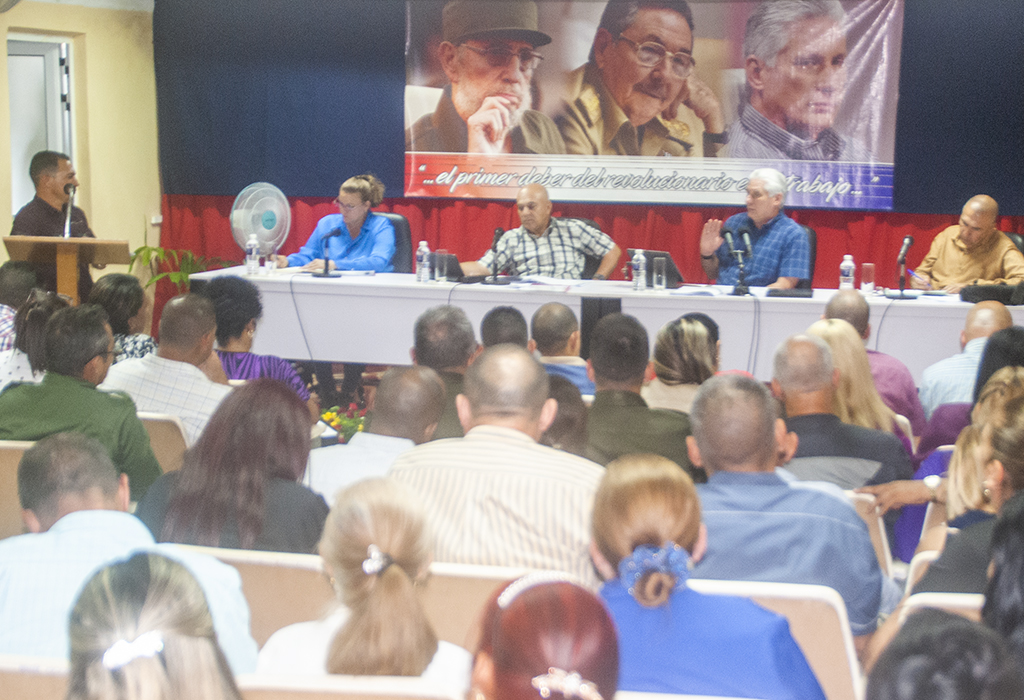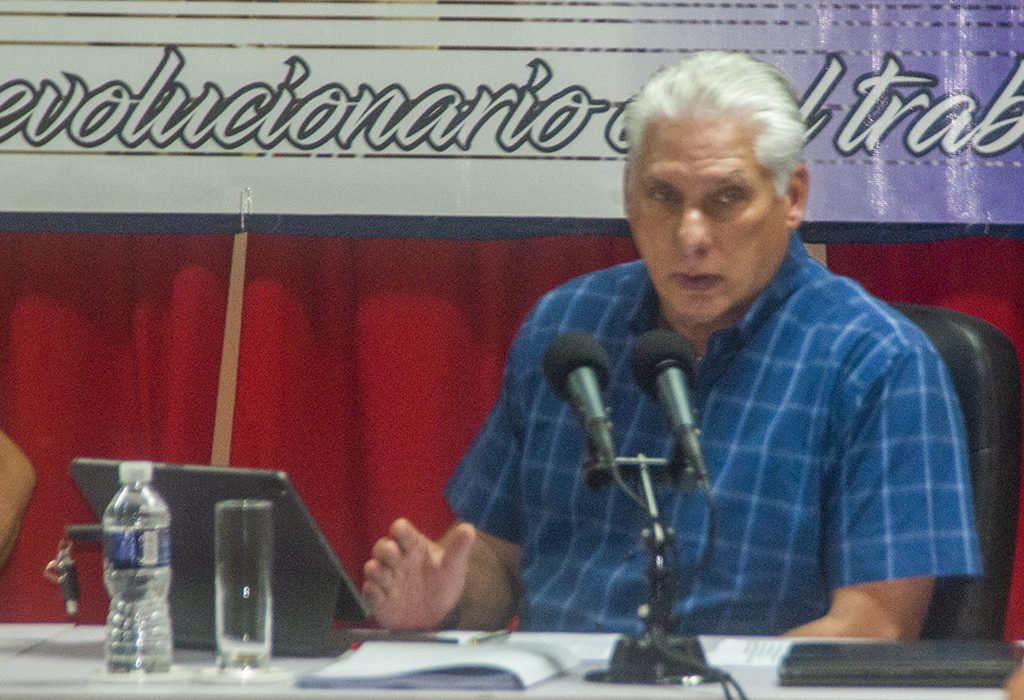
The constant listening to the concerns of citizens should be a priority, said to the political and government authorities of the municipalities of Jobabo and Colombia the first secretary of the Central Committee of the Party and president of the Republic, Miguel Díaz-Canel Bermúdez, during the summary of the exhaustive review made by the highest instance of the Cuban political vanguard to the performance of the organization in these demarcations.
Accompanied by Roberto Morales Ojeda, Secretary of Organization of the Central Committee; Osbel Lorenzo Rodriguez, First Secretary of the Party in Las Tunas; and Yelenis Tornet Menendez, the governor, Díaz-Canel conveyed a message of resilience in the face of adversity. "Problems cannot overwhelm us, there are the experiences we have seen here today to show us that it is possible to overcome."
During the exchange, the Cuban president outlined priority issues for the country, such as concluding the exhaustive review of the relations between public entities and the non-state sector of the economy. The latter, he reiterated, is a necessary complement to our economy; however, he warned, that irregularities and outright corruption have been detected when granting leased premises or making payments for various services or products with public funds. "Faced with this, more popular control, more involvement of the people in the control of these links", he said; and in those cases that merit it, the criminal responsibility of those involved will be requested, he assured.
Similar rigor, he emphasized, will be applied in the fight against drug trafficking. "The Revolution was not made to allow such a scourge that destroys families," he said. Likewise, he indicated to pay attention to other manifestations of marginality degrading to human dignity, whose origin is not always in the economic hardships of Cuban households.
Díaz-Canel also suggested to the two municipalities visited this time to evaluate with specialists what solutions to look for to irrigate more cultivation areas, against the climatic conditions of each space.
He was also optimistic that the Colombia sugar company would be able to produce molasses this year. Not only, he said, because of the repercussions that this will have on the economy of the area, but also because it would contribute electricity to the National Electro-energy System, in addition to ridding the fields of "Colombia" of aged cane strains that affect the quality of the raw material available for future sugar production.
The first secretary of the Central Committee of the Party echoed the concerns of the citizens because, despite the installation of solar panels in the drinking water supply sources, this is not expressing itself in the expected improvement, especially in the pressure with which the liquid is flowing through the pipes. Something that is not explained, he asked, in the small communities.
Bankarization, in the opinion of the statesman, cannot be associated with the lack of cash. "There is a conceptual problem when what we are talking about is that more services flow through digital channels, both state and private, starting with the structures that provide services to farmers," he said.
IN-DEPTH EXAMINATION

As it has happened in the rest of the territories of Las Tunas, before the arrival of the highest authorities of the nation, a partisan commission reviewed in depth the functioning of the political organization in these demarcations, and at the same time, took a look at their main economic and social indicators. After listening to their report, it became clear that both in Jobabo and in Colombia," the popular mobilizations to the farming areas have had a positive impact on agricultural production.
The Party leadership in both districts agreed that they need to rethink much of what they do. From the exchanges with the auxiliary structure of the Central Committee, they are in a position to advance, they assured.
Right now, the aforementioned text reveals that the electric service, water supply, inflation, and problems with the banking system are the issues that most concern people who live in Jobabo and Colombia. The balance of the study on the use of land and livestock, as well as the crime rate on large livestock, is not encouraging, either, they reported.
After hearing this data, Roberto Morales Ojeda, Secretary of Organization of the Central Committee, praised the growth seen in the liaison of the Party's professional apparatus with its grassroots structures. But he criticized the fact that there has not been an adequate response to the other points made to the province since these visits began a year ago.
Likewise, he qualified as insufficient for the number of government cadres that are active in the Party. It is not an exclusive requirement to hold a public office, he clarified; but, he said, it is expected that, at the same time that they have expressed their willingness to assume decision-making responsibilities in the structures of the State, they have a similar posture of political commitment.
The Secretary of the Organization of the Central Committee urged those present to work to change the perception warned by the evaluation commission that the linkage between the leadership of both municipalities and their respective populations is low.
Starting in May, Morales Ojeda anticipated, a second cycle of visits to all Cuban municipalities will begin, but now, more focused on what has changed and transformed from one meeting to another. Because that is what the people expect, he insisted. “The evaluations will be by results,” he announced.
READ MORE
Díaz-Canel in Manatí: "Nothing Can be More Important than Contact with the People
“Nothing can be more important than contact with the people,” said the first secretary of the Central Committee of the Party and president of the Republic, Miguel Díaz-Canel Bermúdez, when summarizing the evaluation of the fulfillment by the Communist Party of Cuba in the municipality of Manatí of the priorities outlined for the year 2024.
Díaz-Canel Visits Puerto Padre
Puerto Padre, Las Tunas. The contacts that the highest leadership of the country is holding with political and government decision-makers of Cuban municipalities are aimed at overcoming the problems together, said in Puerto Padre the first secretary of the Central Committee of the Party and president of the Republic, Miguel Díaz-Canel Bermúdez, who toured the entities that present difficulties in this demarcation.
Díaz-Canel in "Jesús Menéndez," Las Tunas' Easternmost Municipality
“This third visit had a different sense because now we emphasize that these successful experiences do not go backward, above all, because of the demotivating effect it has when that happens,” said the first secretary of the Central Committee of the Communist Party of Cuba (PCC in Spanish) and president of the Republic, Miguel Díaz-Canel Bermúdez, summarizing his stay in the municipality of Jesús Menéndez, north of this eastern Cuban province this April 12.
Díaz-Canel Tours Places of Interest in “Amancio” (Live Coverage)
The problems in the economy and the urgent linkage of its leaders with the citizenry monopolized the attention of the exchange of the first secretary of the Central Committee of the Party and president of the Republic, Miguel Díaz-Canel Bermúdez, with the political and government authorities in the municipality of Amancio, in the south of this eastern Cuban province.
Cuban President Checks Work Priorities in the Eastern Municipality of Majibacoa
"It is urgent to name the solutions, going from the contemplation of the problems to the concrete action that solves them," said the first secretary of the Central Committee of the Party and president of the Republic, Miguel Díaz-Canel Bermúdez, summarizing his working visit to Majibacoa.
President Díaz-Canel Assesses Policy Compliance in Las Tunas
"Nobody will give us what we can do by ourselves," said the first secretary of the Central Committee of the Party and president of the Republic, Miguel Díaz-Canel Bermúdez, before the extraordinary plenary session of the Provincial Committee of the Party in this eastern territory.
Díaz-Canel Summarizes PCC Visit to Las Tunas Capital: “There Can be No Unity without Participation”
"There cannot be unity without participation, without listening to the people", insisted the first secretary of the Central Committee of the Party and president of the Republic, Miguel Díaz-Canel Bermúdez, when summarizing, together with Roberto Morales Ojeda, secretary of Organization of the CCPCC, the party visit to the capital of this eastern Cuban province.





